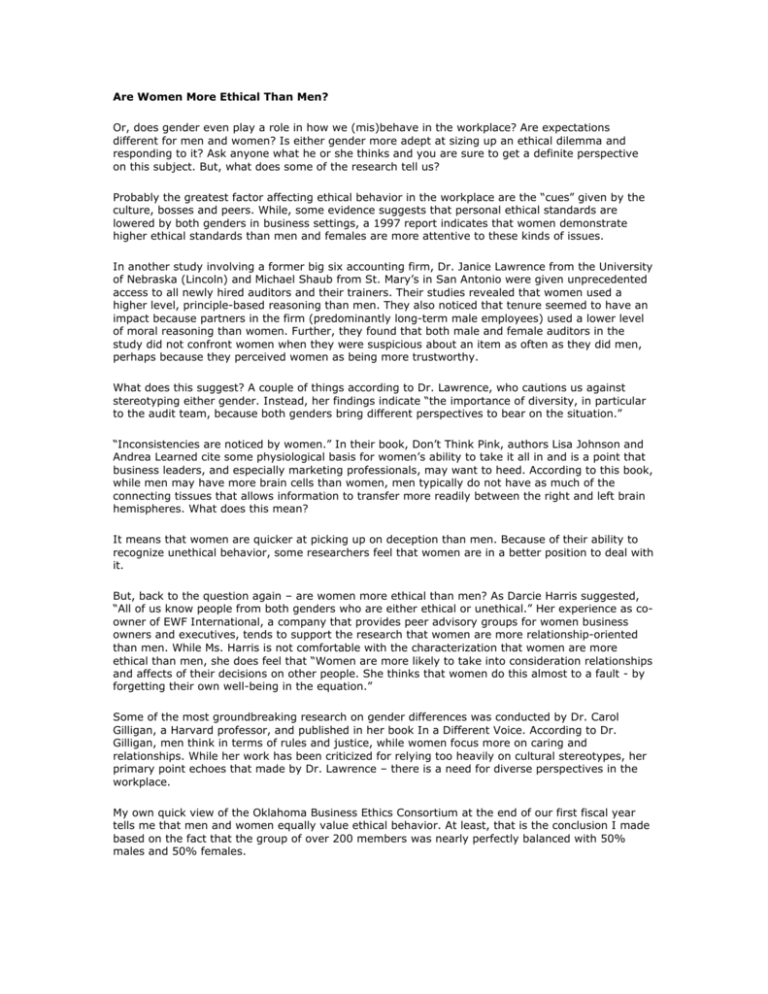Are Women More Ethical Than Men
advertisement

Are Women More Ethical Than Men? Or, does gender even play a role in how we (mis)behave in the workplace? Are expectations different for men and women? Is either gender more adept at sizing up an ethical dilemma and responding to it? Ask anyone what he or she thinks and you are sure to get a definite perspective on this subject. But, what does some of the research tell us? Probably the greatest factor affecting ethical behavior in the workplace are the “cues” given by the culture, bosses and peers. While, some evidence suggests that personal ethical standards are lowered by both genders in business settings, a 1997 report indicates that women demonstrate higher ethical standards than men and females are more attentive to these kinds of issues. In another study involving a former big six accounting firm, Dr. Janice Lawrence from the University of Nebraska (Lincoln) and Michael Shaub from St. Mary’s in San Antonio were given unprecedented access to all newly hired auditors and their trainers. Their studies revealed that women used a higher level, principle-based reasoning than men. They also noticed that tenure seemed to have an impact because partners in the firm (predominantly long-term male employees) used a lower level of moral reasoning than women. Further, they found that both male and female auditors in the study did not confront women when they were suspicious about an item as often as they did men, perhaps because they perceived women as being more trustworthy. What does this suggest? A couple of things according to Dr. Lawrence, who cautions us against stereotyping either gender. Instead, her findings indicate “the importance of diversity, in particular to the audit team, because both genders bring different perspectives to bear on the situation.” “Inconsistencies are noticed by women.” In their book, Don’t Think Pink, authors Lisa Johnson and Andrea Learned cite some physiological basis for women’s ability to take it all in and is a point that business leaders, and especially marketing professionals, may want to heed. According to this book, while men may have more brain cells than women, men typically do not have as much of the connecting tissues that allows information to transfer more readily between the right and left brain hemispheres. What does this mean? It means that women are quicker at picking up on deception than men. Because of their ability to recognize unethical behavior, some researchers feel that women are in a better position to deal with it. But, back to the question again – are women more ethical than men? As Darcie Harris suggested, “All of us know people from both genders who are either ethical or unethical.” Her experience as coowner of EWF International, a company that provides peer advisory groups for women business owners and executives, tends to support the research that women are more relationship-oriented than men. While Ms. Harris is not comfortable with the characterization that women are more ethical than men, she does feel that “Women are more likely to take into consideration relationships and affects of their decisions on other people. She thinks that women do this almost to a fault - by forgetting their own well-being in the equation.” Some of the most groundbreaking research on gender differences was conducted by Dr. Carol Gilligan, a Harvard professor, and published in her book In a Different Voice. According to Dr. Gilligan, men think in terms of rules and justice, while women focus more on caring and relationships. While her work has been criticized for relying too heavily on cultural stereotypes, her primary point echoes that made by Dr. Lawrence – there is a need for diverse perspectives in the workplace. My own quick view of the Oklahoma Business Ethics Consortium at the end of our first fiscal year tells me that men and women equally value ethical behavior. At least, that is the conclusion I made based on the fact that the group of over 200 members was nearly perfectly balanced with 50% males and 50% females. What do you think? Do men and women have different values and approaches to ethical decisionmaking in the workplace? We want to hear from you, so please send your insights, perspectives and opinions to warrenokla@cox.net




